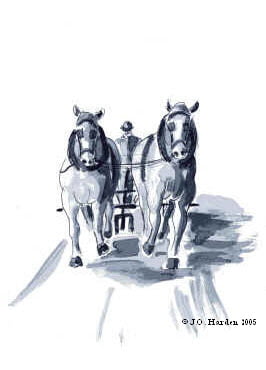
Employment
Fovant, typical of many pre-20th century small villages, was a somewhat enclosed community. Many families were inter-related and largely speaking everything was tied to the land. Employment was necessarily interdependent, therefore co-operation in communal matters was of prime importance. Harmoniously or otherwise, owners, tenants and their workforce farmed land, cut timber, ground corn, tended flocks of sheep and cattle, operated forges, quarried stone and chalk, burnt lime and worked smallholdings, for mutual benefit.
The village was virtually self-sufficient, a situation, which remained until the present main road west, the current A30, was made in 1702. Eventually this road superseded the turnpike road, which ran along the top of the downs, and in 1787 was itself established as the Turnpike under Salisbury Plain. As this lower road became popular with travellers, outside influence was brought to bear on Fovant. Inevitably the opening of the village to the wider world followed.
Population movement into and out of Fovant had previously been limited to the distance a carrier’s cart could travel in one day This type of movement, which had always happened between villages, can be deduced from the listing of each resident’s birthplace in the census statistics. Employment was still mainly agricultural, but other trades and professions seeped in as people moved in from areas beyond the previous radius.
Change generated by the railway at Dinton produced a ripple effect on the employment pattern throughout nearby areas. This change is reflected in the establishment of a brick works at Dinton itself, grain mills at Compton, watercress beds at Fovant, the expansion of the carpet factory at Wilton, and at Tisbury not only the opening of a branch of this carpet factory but also at Tisbury, a glove factory, a laundry, an agricultural machinery factory and a brewery. Additionally of course, there was the railway itself as a source of employment.
Employment opportunities “snowballed” as people moved further out to work. Trade and custom moved into the village, particularly during the 1914-18 war as the military camps were established at Fovant. The 1939-45 war besides taking many of the young of the village even further afield, also provided employment opportunities for those who stayed at home.
Most Fovant residents today use their cars or public transport to take advantage of the full extent of employment opportunities that commuting makes possible. However, a relatively wide range of village-based employment still exists. We still have a garage, a post office, Fovant Stores and a doctor’s surgery with associated pharmacy from the previous era. Additionally, several small businesses have been set up within the village. These include a furniture restorer, a chartered surveyor, a trout farm, an irrigation service, a stonemason, a hairdresser, a nursery school, a landscape gardener and a restaurant. Several farms are still operative, but each of these is either let, or managed with the minimum of manpower and the maximum of mechanisation.
Click on the links below to find more information on the various aspects of employment in Fovant:
The influence of the Military on local employment
J.O.H.
2003
